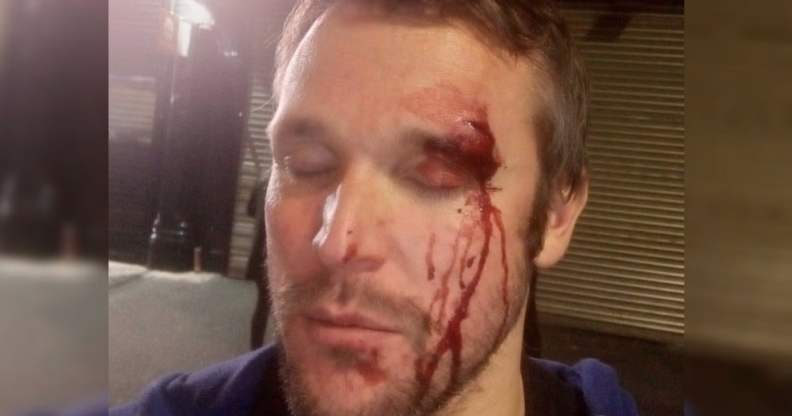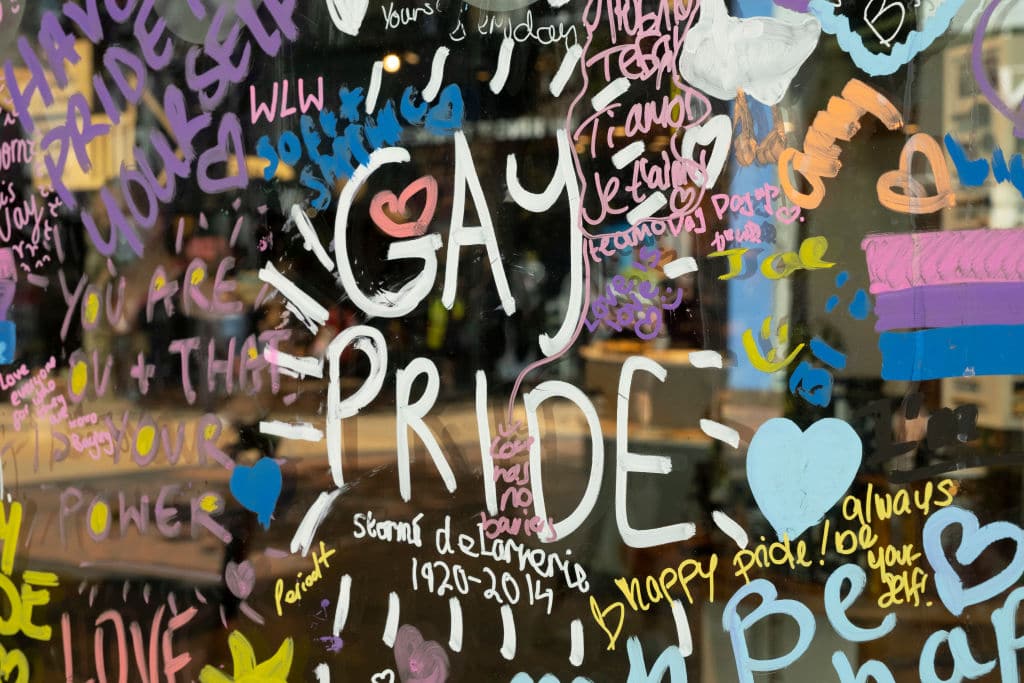Birmingham’s LGBT+ community ‘doesn’t feel safe on the streets’ after spate of homophobic attacks

John-Paul Kesseler was victim to an unprovoked homophobic attack after holding another man’s hand in public (Twitter/@jpkesseler)
Birmingham’s LGBT+ community is frightened, anxious and appalled after yet another homophobic attack in the city’s Gay Village.
There was widespread shock and revulsion on social media over the weekend when John-Paul Kesseler shared a photo of himself with blood streaming down his face after he was attacked for holding another man’s hand in the early hours of Sunday morning (10 October).
Kesseler was on his way back to a hotel with a friend at the end of a night out in Birmingham’s Gay Village when a stranger told them to stop holding hands.
The man subsequently reached into his car, pulled out an empty wine bottle, and hit Kesseler across the head with it. The assailant went on to hit him with a metal pole.
The shocking attack is just the latest in a string of anti-LGBT+ hate crimes to take place in Birmingham in recent months. In September, a gay man named Matt Brooks was rushed to hospital after he was punched in the face in the city’s Gay Village.
The punch was so forceful that Brooks was left with a fractured eye socket. He had to undergo emergency surgery to save his eyesight.
Police in Birmingham announced that they were stepping up their presence on the streets after a similar attack in September, which saw a married couple visiting the city violently assaulted in the Gay Village.
LGBT+ people can’t ‘walk the streets and feel safe’ in Birmingham following recent hate crimes
Steph Keeble, director of charity Birmingham LGBT, told PinkNews that the spate of homophobic attacks in the Gay Village has created a culture of fear and anxiety for queer people in the city.
“The community is feeling anxious and we’re trying to reassure and encourage them to come forward if they need support,” Keeble said.
“People are going to start feeling anxious about going out and that’s just not acceptable that people can’t walk the streets and feel safe.”
Birmingham has historically “felt very safe”, according to Keeble. She was horrified when she saw the picture of John-Paul Kesseler with blood pouring down his face.
“Like everybody else, I was appalled. We’re all appalled by it. We stand in solidarity with the victim. Anybody who saw that would be absolutely appalled that anybody could do that.
Bottle round my fucking head for holding another man's hand. Fuck the fuck off. pic.twitter.com/QYCMY6kBtK
— JP (@jpkesseler) October 10, 2021
“But sadly we live in a world where we’re still at risk just because of our sexual orientation and gender identity. I think that’s what it brings home for people.”
The statistics are clear – hate crime is on the rise all across the UK – but Birmingham is quickly becoming the physical manifestation of those frightening figures. Keeble’s charity is “very concerned” by what’s going on.
“The Gay Village is somewhere where people should feel safe, not somewhere where people should be attacked and assaulted. We’ve been encouraging everybody to report anything that happens, which could account for some of the increase, but the actual incidents in the Gay Village – I haven’t known of something like that for a very long time.”
In 2019, Birmingham became the centre of national attention when protests broke out at a primary school over an LGBT+ inclusive educational programme called No Outsiders. That led much of the country to question what was going on in Birmingham – to figure out why LGBT+ people had become the enemy to some sections of society.
But the recent spate of attacks “feels like a new thing” entirely to Keeble.
“We had the stuff around the No Outsiders programme, parents protesting, but even then we didn’t have these sorts of incidents in the Gay Village,” Keeble said.
“There have been some areas of concern but this almost feels like a new thing. This is the weekend after Pride. Is there ever a reason for hate crime other than homophobia?”
The insidious culture of homophobia has been felt in a tangible way by Keeble’s charity. It has been on the receiving end of what is thought to have been homophobic abuse.
“We’ve had a number of occasions where we’ve received malicious communication during lockdown. We had our windows broken twice,” Keeble said.
“The first time, I just thought, OK, it’s a bit of vandalism. But when it happened again and we were the only business in that area that was targeted – there were lots of other businesses that were in lockdown with nobody there – you do start to think, ‘This is a homophobic incident.'”
The rise in anti-LGBT+ incidents has occurred against a backdrop of government inaction. A much-discussed conversion therapy ban is yet to materialise, and plans to reform the Gender Recognition Act (GRA) were scrapped by the Tories.
Keeble doesn’t know if that inaction can be linked to the recent homophobic incidents in Birmingham, but she can see that the outlook for LGBT+ people in the UK appears to be backsliding.
She is calling on the government to “take a really firm approach and say: ‘This isn’t acceptable’ when it comes to homophobic hate.
Keeble is also adamant that police are taking the most recent case “very seriously”.
“Hopefully there will be an arrest. That’s what we want, the right response is that a message is sent out by the criminal justice system that this isn’t acceptable.”

Shop window graffiti in support of the local gay and lesbian pride events on 14th June 2021 in Birmingham, United Kingdom. (Mike Kemp/In Pictures via Getty)
‘Leadership in government’ is needed to stamp out the scourge of hate crime
The rise in hate crime in Birmingham is not an isolated occurrence. Figures show that anti-LGBT+ attacks have been rising steadily all across the UK for years.
Data obtained by Vice showed that there were 6,363 reports of hate crimes based on sexual orientation in 2014-15 compared to 19,679 in 2020-2021. That’s an increase of 210 per cent in the space of just a few years.
Transphobic hate crimes have quadrupled in that same period, the data shows.
The trend is of particular concern to Galop, a national charity that works with LGBT+ people who have been targeted with violence and abuse.
Leni Morris, chief executive of Galop, said figures and their own research indicate that some 90 per cent of hate crimes go unreported. This suggests that the official statistics are only a snapshot of what the LGBT+ community is experiencing.
“As we have sadly seen recently in the media, anti-LGBT+ hate crime is often more violent than other forms of hate crime – our last research report found that almost a third of anti-LGBT+ hate crime victims had been physically attacked and almost one in five had experienced sexual violence.
“And yet, anti-LGBT+ hate crimes have low prosecution rates and the 2018 review of the handling of cases by Her Majesty’s Inspectorate of Constabulary and Fire & Rescue Services found the police response to anti-LGBT+ hate crimes to be ‘not good enough’ in half of cases.”
The emotional impact of hate crime is wide-reaching. People report experiencing high levels of “emotional distress” after such incidents, and many change their behaviour in an effort to avoid future attacks. The result is that some LGBT+ people respond by hiding themselves away from society and avoiding going out.
Galop launched an LGBT+ hate crime helpline in February to help deal with the fallout of homophobic and transphobic attacks – but this isn’t enough, according to Morris.
“We need leadership in government, institutions, and communities across civil society to recognise anti-LGBT+ prejudice, challenge it, and provide specialist services for those targeted, in order that LGBT+ people can lead their lives in safety and with dignity, free from abuse and violence.”

